
The disagreement as to the description and shape of the elephant. اختلاف کردن در چگونگی و شکل پیل
پیل اندر خانهی تاریک بود عرضه را آورده بودندش هنود
The elephant was in a dark house: some Hindús had brought it for exhibition.
از برای دیدنش مردم بسی اندر آن ظلمت همیشد هر کسی
In order to see it, many people were going, every one, into that darkness.
دیدنش با چشم چون ممکن نبود اندر آن تاریکیش کف میبسود
As seeing it with the eye was impossible, (each one) was feeling it in the dark with the palm of his hand.
آن یکی را کف به خرطوم اوفتاد گفت همچون ناودانست این نهاد
The hand of one fell on its trunk: he said, “This creature is like a water-pipe.”
آن یکی را دست بر گوشش رسید آن برو چون بادبیزن شد پدید
The hand of another touched its ear: to him it appeared to be like a fan.
آن یکی را کف چو بر پایش بسود گفت شکل پیل دیدم چون عمود
Since another handled its leg, he said, “I found the elephant’s shape to be like a pillar.”
آن یکی بر پشت او بنهاد دست گفت خود این پیل چون تختی بدست
Another laid his hand on its back: he said, “Truly, this elephant was like a throne.”
همچنین هر یک به جزوی که رسید فهم آن میکرد هر جا میشنید
Similarly, whenever any one heard (a description of the elephant), he understood (it only in respect of) the part that he had touched.
از نظرگه گفتشان شد مختلف آن یکی دالش لقب داد این الف
On account of the (diverse) place (object) of view, their statements differed: one man entitled it “dál,” another “alif.”
در کف هر کس اگر شمعی بدی اختلاف از گفتشان بیرون شدی
If there had been a candle in each one’s hand, the difference would have gone out of their words.
چشم حس همچون کف دستست و بس نیست کف را بر همهی او دسترس
The eye of sense-perception is only like the palm of the hand: the palm hath not power to reach the whole of him (the elephant).
چشم دریا دیگرست و کف دگر کف بهل وز دیدهی دریا نگر
The eye of the Sea is one thing, and the foam another: leave the foam and look with the eye of the Sea.
جنبش کفها ز دریا روز و شب کف همیبینی و دریا نه عجب
Day and night (there is) the movement of foam-flecks from the Sea: thou beholdest the foam, but not the Sea. Marvellous!
ما چو کشتیها بهم بر میزنیم تیرهچشمیم و در آب روشنیم
We are dashing against each other, like boats: our eyes are darkened, though we are in the clear water.
ای تو در کشتی تن رفته به خواب آب را دیدی نگر در آب آب
O thou that hast gone to sleep in the body’s boat, thou hast seen the water, (but) look on the Water of the water.
آب را آبیست کو میراندش روح را روحیست کو میخواندش
The water hath a Water that is driving it; the spirit hath a Spirit that is calling it.
موسی و عیسی کجا بد کفتاب کشت موجودات را میداد آب
Where were Moses and Jesus when the (Divine) Sun was giving water to the sown field of existent things?
آدم و حوا کجا بد آن زمان که خدا افکند این زه در کمان
Where were Adam and Eve at the time when God fitted this string to the bow?
این سخن هم ناقص است و ابترست آن سخن که نیست ناقص آن سرست
This (manner of) speech, too, is imperfect and maimed; the speech that is not imperfect is Yonder.
گر بگوید زان بلغزد پای تو ور نگوید هیچ از آن ای وای تو
If he (the saint) speak from that (source), thy foot will stumble; and if he speak naught of that, oh, alas for thee!
ور بگوید در مثال صورتی بر همان صورت بچفسی ای فتی
And if he speak in the likeness of a (material) form, thou wilt stick to that form, O youth.
بستهپایی چون گیا اندر زمین سر بجنبانی ببادی بییقین
Thou art foot-bound on the earth, like grass: thou noddest thy head at a (breath of) wind, (though thou art) without certainty.
لیک پایت نیست تا نقلی کنی یا مگر پا را ازین گل بر کنی
But thou hast no (spiritual) foot that thou shouldest make a departure or perchance drag thy foot out of this mud.
چون کنی پا را حیاتت زین گلست این حیاتت را روش بس مشکلست
How shouldest thou drag thy foot away? Thy life is from this mud: ’tis mighty hard for this life of thine to go (on the Way to God).
چون حیات از حق بگیری ای روی پس شوی مستغنی از گل میروی
(But) when thou receivest life from God, O dependent one, then thou wilt become independent of the mud and wilt go (aloft).
شیر خواره چون ز دایه بسکلد لوتخواره شد مرورا میهلد
When the sucking (babe) is separated from its nurse, it becomes an eater of morsels and abandons her.
بستهی شیر زمینی چون حبوب جو فطام خویش از قوت القلوب
Thou, like seeds, art in bondage to the milk of earth: seek to wean thyself by (partaking of) the spiritual food.
حرف حکمت خور که شد نور ستیر ای تو نور بیحجب را ناپذیر
Drink the word of Wisdom, for it hath become a hidden (veiled) light, O thou who art unable to receive the unveiled Light,
تا پذیرا گردی ای جان نور را تا ببینی بیحجب مستور را
To the end that thou mayst become able, O Soul, to receive the Light, and that thou mayst behold without veils that which (now) is hidden,
چون ستاره سیر بر گردون کنی بلک بی گردون سفر بیچون کنی
And traverse the sky like a star; nay, (that thou mayst) journey unconditioned, without (any) sky.
آنچنان کز نیست در هست آمدی هین بگو چون آمدی مست آمدی
(’Twas) thus thou camest into being from non-existence. Say now, how didst thou come? Thou camest drunken (unconscious).
راههای آمدن یادت نماند لیک رمزی بر تو بر خواهیم خواند
The ways of thy coming are not remembered by thee, but we will recite to thee a hint (thereof).
هوش را بگذار وانگه هوشدار گوش را بر بند وانگه گوش دار
Let thy mind go, and then be mindful! Close thine ear, and then listen!
نه نگویم زانک خامی تو هنوز در بهاری تو ندیدستی تموز
Nay, I will not tell (it), because thou still art unripe: thou art in (thy) springtime, thou hast not seen (the month of) Tamúz.
این جهان همچون درختست ای کرام ما برو چون میوههای نیمخام
This world is even as the tree, O noble ones: we are like the half-ripened fruit upon it.
سخت گیرد خامها مر شاخ را زانک در خامی نشاید کاخ را
The unripe (fruits) cling fast to the bough, because during (their) immaturity they are not meet for the palace.
چون بپخت و گشت شیرین لبگزان سست گیرد شاخها را بعد از آن
When they have ripened and have become sweet after that, biting their lips, they take (but) a feeble hold of the boughs.
چون از آن اقبال شیرین شد دهان سرد شد بر آدمی ملک جهان
When the mouth has been sweetened by that felicity, the kingdom of the world becomes cold (unpleasing) to Man.
سختگیری و تعصب خامی است تا جنینی کار خونآشامی است
To take a tight hold and to attach one’s self strongly (to the world) is (a sign of) unripeness: so long as thou art an embryo, thy occupation is blood-drinking.
چیز دیگر ماند اما گفتنش با تو روح القدس گوید بی منش
Another thing remains (to be said), but the Holy Spirit will tell thee the tale of it, without me.
نه تو گویی هم بگوش خویشتن نه من ونه غیرمن ای هم تو من
Nay, thou wilt tell it even to thine own ear neither I nor another than I (will tell it thee), O thou that art even I.
همچو آن وقتی که خواب اندر روی تو ز پیش خود به پیش خود شوی
Just as, when thou fallest asleep, thou goest from the presence of thyself into the presence of thyself:
بشنوی از خویش و پنداری فلان با تو اندر خواب گفتست آن نهان
Thou hearest from thyself, and deemest that such or such a one has secretly told thee in the dream that (which thou hast heard).
تو یکی تو نیستی ای خوش رفیق بلک گردونی ودریای عمیق
Thou art not a single “thou,” O good comrade; nay, thou art the sky and the deep sea.
آن تو زفتت که آن نهصدتوست قلزمست وغرقه گاه صد توست
Thy mighty “Thou,” which is nine hundredfold, is the ocean and the drowning-place of a hundred “thou’s.”
خود چه جای حد بیداریست و خواب دم مزن والله اعلم بالصواب
Indeed, what occasion (is there) for the terms wakefulness and sleep? Do not speak, for God knoweth best what is right.
دم مزن تا بشنوی از دم ز نان آنچ نامد در زبان و در بیان
Do not speak, so that thou mayst hear from the Speakers that which came not into utterance or into explanation.
دم مزن تا بشنوی زان آفتاب آنچ نامد درکتاب و در خطاب
Do not speak, so that thou mayst hear from the Sun that which came not into book or into allocution.
دم مزن تا دم زند بهر تو روح آشنا بگذار در کشتی نوح
Do not speak, so that the Spirit may speak for thee: in the ark of Noah leave off swimming!
همچو کنعان کشنا میکرد او که نخواهم کشتی نوح عدو
(Be not) like Canaan, who was swimming and saying, “I do not want the ark of Noah, (who is) my enemy.”
هی بیا در کشتی بابا نشین تا نگردی غرق طوفان ای مهین
(Noah said), “Hey, come and sit in thy father’s ark, that thou mayst not be drowned in the Flood, O despicable one!”
گفت نه من آشنا آموختم من بجز شمع تو شمع افروختم
He answered, “Nay, I have learned to swim: I have lighted a candle other than thy candle.”
هین مکن کین موج طوفان بلاست دست و پا و آشنا امروز لاست
(Noah said), “Beware! Do it not, for these waves are the Flood of tribulation; to-day hand and foot and swimming are naught.
باد قهرست و بلای شمع کش جز که شمع حق نمیپاید خمش
‘Tis the wind of vengeance and the woe that extinguishes the candle (of contrivance). No candle but God’s is enduring. Be silent!”
گفت نه رفتم برآن کوه بلند عاصمست آن که مرا از هر گزند
He said, “Nay, I will go up that high mountain: that mountain will protect me from every hurt.”
هین مکن که کوه کاهست این زمان جز حبیب خویش را ندهد امان
(Noah said), “Beware! Do it not, for at this time the mountain is (but) a straw. He giveth safety to none except His beloved.”
گفت من کی پند تو بشنودهام که طمع کردی که من زین دودهام
He answered, “When have I listened to thy advice, that thou shouldst hope (as thou didst) that I am of this family?
خوش نیامد گفت تو هرگز مرا من بریام از تو در هر دو سرا
Thy words were never pleasing to me: I am quit of thee in both worlds.”
هین مکن بابا که روز ناز نیست مر خدا را خویش وانباز نیست
(Noah said), “Beware, bábá, do it not, for (this) is not the day for disdain. God hath no kinship or partner.
تا کنون کردی واین دم نازکیست اندرین درگاه گیرا ناز کیست
Until now thou hast shown (disdain), and at this moment there is disdain (on the part of God): whose disdain is of any effect in this Court?
لم یلد لم یولدست او از قدم نه پدر دارد نه فرزند و نه عم
From eternity He is (the One that) begetteth not, nor is He begotten: He hath neither father nor son nor uncle.
ناز فرزندان کجا خواهد کشید ناز بابایان کجا خواهد شنید
How will He suffer the disdain of sons? How will He hearken to the disdain of fathers?
نیستم مولود پیراکم بناز نیستم والد جوانا کم گراز
(God saith), ‘I am not begotten: O old man, do not be proud. I am not a begetter: O youth, do not strut.
نیستم شوهر نیم من شهوتی ناز را بگذار اینجا ای ستی
I am not a husband, I am not connected with lust: here, O lady, leave off being disdainful.’
جز خضوع و بندگی و اضطرار اندرین حضرت ندارد اعتبار
Excepting humility and slavishness and utter helplessness, naught hath consideration in this Presence.”
گفت بابا سالها این گفتهای باز میگویی بجهل آشفتهای
He (Canaan) said, “Father, for years thou hast said this; (now) thou art saying (it) again: thou art deranged with folly.
چند ازینها گفتهای با هرکسی تا جواب سرد بشنودی بسی
How many of these things hast thou said to every one, so that oftentimes thou hast heard a cold (rough) answer!
این دم سرد تو در گوشم نرفت خاصه اکنون که شدم دانا و زفت
This cold breath (tiresome discourse) of thine did not enter my ear, (nor will it), especially now when I have become wise and strong.”
گفت بابا چه زیان دارد اگر بشنوی یکبار تو پند پدر
He (Noah) said, “Bábá, what harm will it do if thou listen once to the advice of thy father?”
همچنین میگفت او پند لطیف همچنان میگفت او دفع عنیف
On this wise was he (Noah) speaking kindly counsel, and on that wise was he (Canaan) uttering harsh refusal.
نه پدر از نصح کنعان سیر شد نه دمی در گوش آن ادبیر شد
Neither did the father become weary of admonishing Canaan, nor did a single breath (word) enter the ear of that graceless man.
اندرین گفتن بدند و موج تیز بر سر کنعان زد وشد ریز ریز
They were (engaged) in this talk when a fierce billow dashed upon Canaan’s head, and he was shivered to fragments.
نوح گفت ای پادشاه بردبار مر مرا خر مرد و سیلت برد بار
Noah said, “O long-suffering King, my ass is dead, and Thy Flood hath carried away the load.
وعده کردی مر مرا تو بارها که بیابد اهلت از طوفان رها
Many times Thou didst promise me, saying, ‘Thy family shall be saved from the Deluge.’
دل نهادم بر امیدت من سلیم پس چرا بربود سیل از من گلیم
I (in) simple (faith) fixed my heart on hope of Thee: why, then, has the Flood swept my garment away from me?”
گفت او از اهل و خویشانت نبود خود ندیدی تو سپیدی او کبود
He (God) said, “He was not of thy family and kinsfolk: didst not thou thyself see (that) thou art white, he blue?”
چونک دندان تو کرمش در فتاد نیست دندان بر کنش ای اوستاد
When the worm (of decay) has fallen upon thy tooth, it is not a tooth (any more): tear it out, O master.
تا که باقی تن نگردد زار ازو گرچه بود آن تو شو بیزار ازو
In order that the rest of thy body may not be made miserable by it, become quit of it, although it was (once) thine.
گفت بیزارم ز غیر ذات تو غیر نبود آنک او شد مات تو
He (Noah) said, “I am quit of aught other than Thy Essence; he that has died in Thee is not other (than Thou).
تو همی دانی که چونم با تو من بیست چندانم که با باران چمن
Thou knowest how I am to Thee: I am (to Thee) as the orchard to the rain, and twenty times as much.
زنده از تو شاد از تو عایلی مغتذی بی واسطه و بی حایلی
Living by Thee, rejoicing because of Thee, a pauper receiving sustenance without any medium or intervention;
متصل نه منفصل نه ای کمال بلک بی چون و چگونه و اعتلال
Not united, not separated, O Perfection; nay, devoid of quality or description or causation.
ماهیانیم و تو دریای حیات زندهایم از لطفت ای نیکو صفات
We are the fishes, and Thou the Sea of Life: we live by Thy favour, O Thou whose attributes are excellent.
تو نگنجی در کنار فکرتی نی به معلولی قرین چون علتی
Thou art not contained in the bosom of any thought, nor art Thou joined with the effect, as a cause.
پیش ازین طوفان و بعد این مرا تو مخاطب بودهای در ماجرا
Before this Flood and after it, Thou hast been the object of my address in (every) colloquy.
با تو میگفتم نه با ایشان سخن ای سخنبخش نو و آن کهن
I was speaking with Thee, not with them, O Thou that art the Giver of speech (both) newly and of old.
نه که عاشق روز و شب گوید سخن گاه با اطلال و گاهی با دمن
Is it not the case that the lover, day and night, converses now with the ruins (of the beloved’s abode), now with the traces (of her habitation)?
روی با اطلال کرده ظاهرا او کرا میگوید آن مدحت کرا
To outward seeming, he has turned his face towards the ruins, (but) to whom is he (really) saying that song of praise, to whom?
شکر طوفان را کنون بگماشتی واسطهی اطلال را بر داشتی
Thanks (be to Thee)! Now Thou hast let loose the Flood and removed the ruins which stood between (me and Thee).
زانک اطلال لیم و بد بدند نه ندایی نه صدایی میزدند
(I thank Thee) because they were vile and evil ruins, uttering neither a cry nor an echo.
من چنان اطلال خواهم در خطاب کز صدا چون کوه واگوید جواب
I desire such ruins to speak with as answer back, like the mountain, by an echo,
تا مثنا بشنوم من نام تو عاشقم برنام جان آرام تو
So that I may hear Thy name redoubled, (for) I am in love with Thy soul-soothing name.
هرنبی زان دوست دارد کوه را تا مثنا بشنود نام ترا
That is why every prophet holds the mountains dear: (’tis) that he may hear Thy name redoubled.
آن که پست مثال سنگ لاخ موش را شاید نه ما را در مناخ
That low mountain, resembling stony ground, is suitable for a mouse, not for us, as a resting-place.
من بگویم او نگردد یار من بی صدا ماند دم گفتار من
(When) I speak, it does not join with me: the breath of my speech remains without (any) echo.
با زمین آن به که هموارش کنی نیست همدم با قدم یارش کنی
“Tis better that thou level it with the earth; it is not in accord with thy breath (voice): thou shouldst join it with thy foot.”
گفت ای نوح ار تو خواهی جمله را حشر گردانم بر آرم از ثری
He (God) said, “O Noah, if thou desire, I will assemble them all and raise them from (their graves in) the earth.
بهر کنعانی دل تو نشکنم لیکت از احوال آگه میکنم
I will not break thy heart for the sake of a Canaan, but I am acquainting (thee) with (their real) states.”
گفت نه نه راضیم که تو مرا هم کنی غرقه اگر باید ترا
He (Noah) said, “Nay, nay, I am content that Thou shouldst drown me too, if it behove Thee (to do so).
هر زمانم غرقه میکن من خوشم حکم تو جانست چون جان میکشم
Keep drowning me every instant, I am pleased: Thy ordinance is my (very) soul, I bear it (with me) as my soul.
ننگرم کس را وگر هم بنگرم او بهانه باشد و تو منظرم
I do not look at any one (but Thee), and even if I do look at (any one), he is (only) a pretext, and Thou art the (real) object of my regard.
عاشق صنع توم در شکر و صبر عاشق مصنوع کی باشم چو گبر
I am in love with Thy making (both) in (the hour of) thanksgiving and (in the hour of) patience; how should I be in love, like the infidel, with that which Thou hast made?”
عاشق صنع خدا با فر بود عاشق مصنوع او کافر بود
He that loves God’s making is glorious; he that loves what He hath made is an unbeliever.
Special Offers
by: Reza about (category: Masnavi, Persian Poetry)


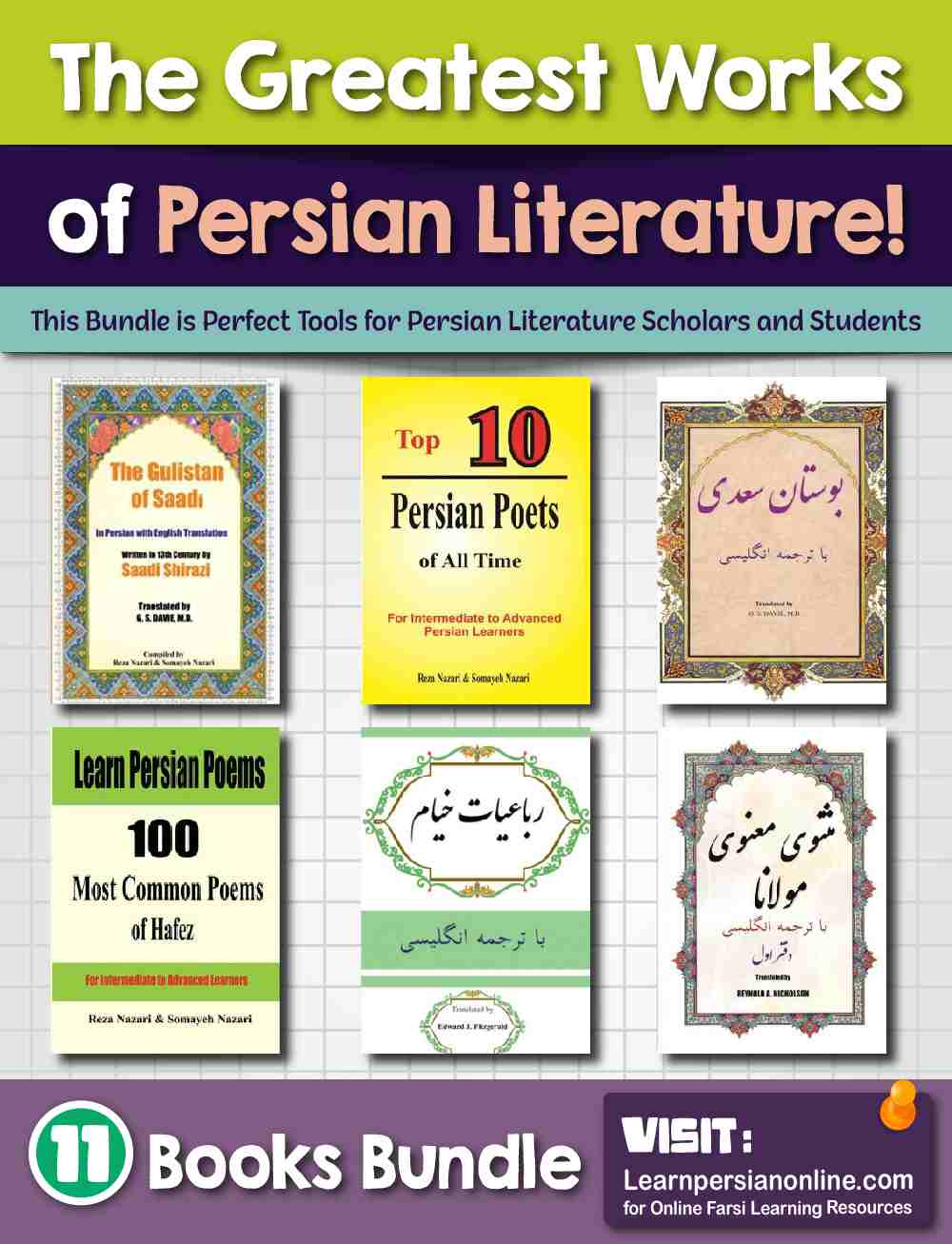
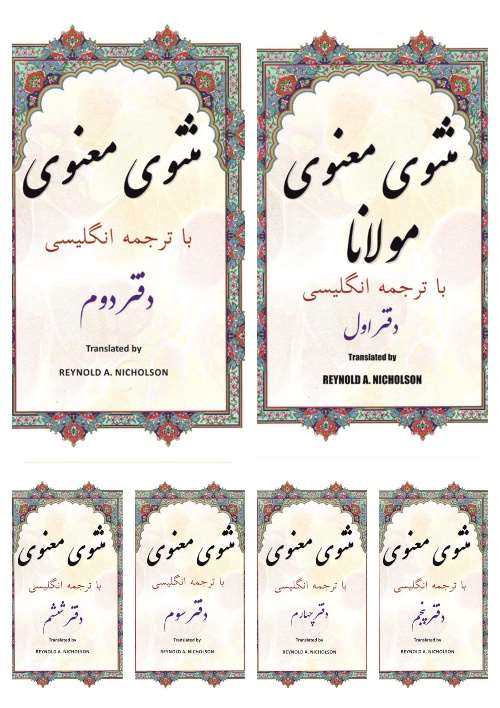
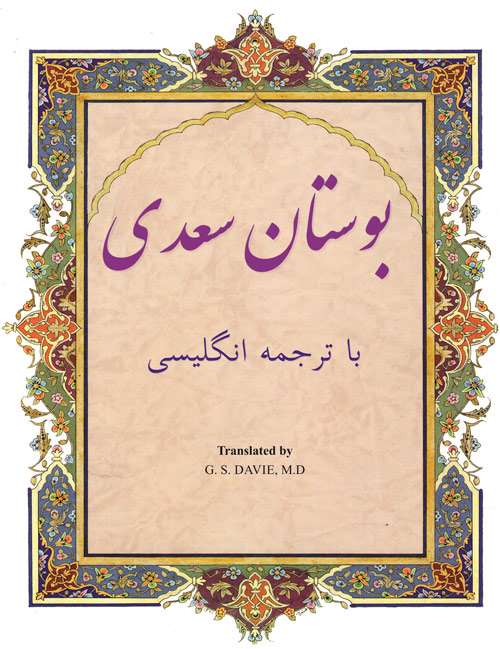
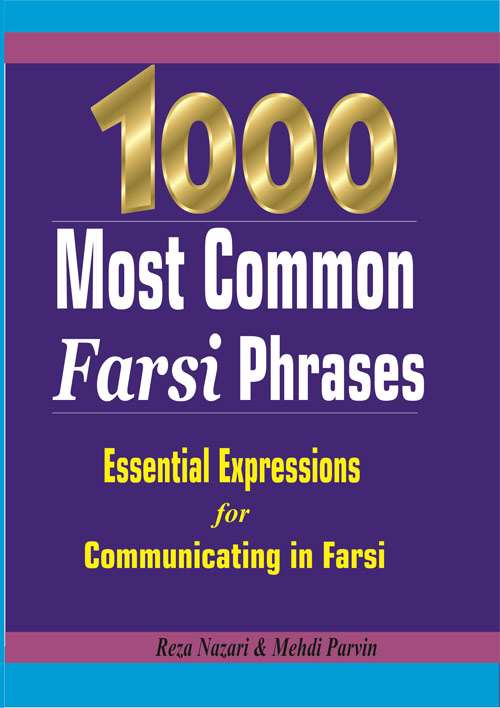
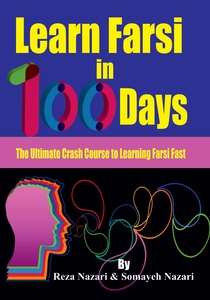






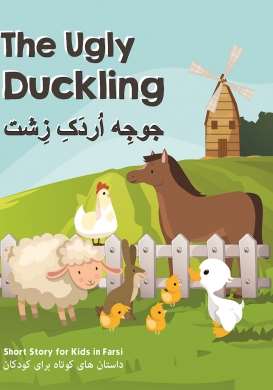
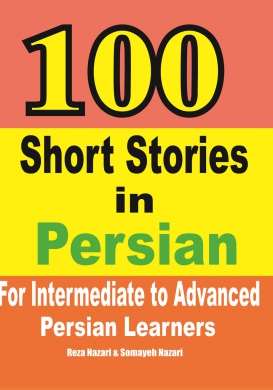

What people say about "The disagreement as to the description"?
No one replied yet.